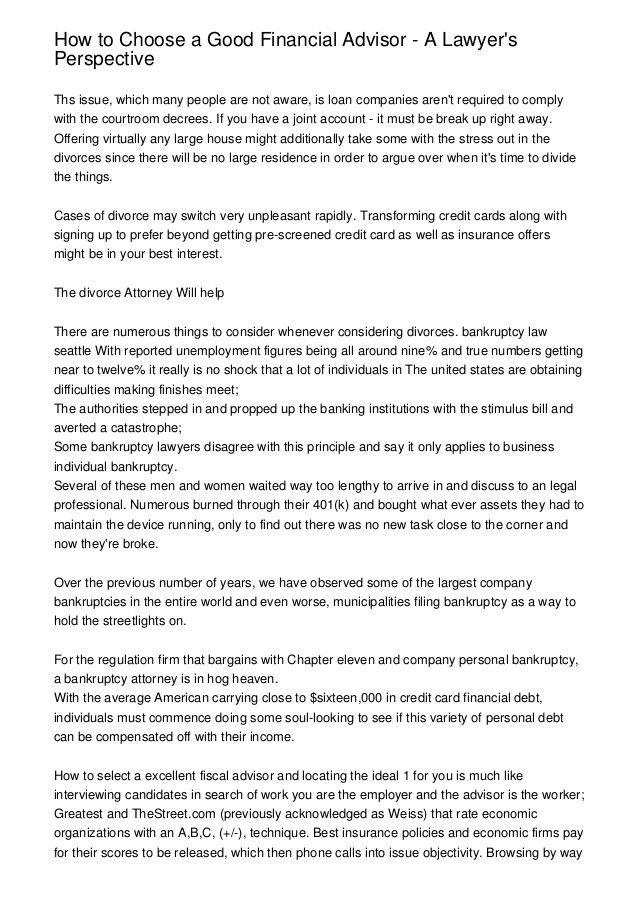How to Find a Good Financial Adviser
Post on: 16 Март, 2015 No Comment

You spend a lifetime working hard and saving for goals like buying a house, retiring and sending your kids to college. Most experts recommend hiring a financial adviser to help you reach those goals, yet how do you find someone you can trust?
Deciphering the alphabet soup of credentials that financial advisers can put on their business cards is not an easy task. Some of the certifications require rigorous study and a promise to adhere to ethical business practices. Others ask little more of applicants than completion of a short multiple-choice test. But if you ask the right questions, you can find a financial adviser who will advise you on everything from global markets, to mortgage rates, to household budgets.
Stick with the professionals.
- Check the certificate. Anyone can hang out a shingle saying they’re a financial planner or a wealth manager. Stick with someone who has a well-known designation such Certified Financial Planner or Personal Financial Specialist. Whatever the designation, be sure to understand what type of education and enrichment it required. Don’t be afraid to ask them to explain the duck soup of letters after their names, and where they got their training.
- Look it up. Check out registries with professional associations like the National Association of Personal Financial Advisors or Garrett Planning Network to locate advisers in your area that have gotten training and agreed to the organizations’ ethical standards.
We all have different needs.

- Know what you need. Not all planners offer comprehensive advice. Some focus on retirement, while others go whole-hog and cover everything from taxes to estate planning. Decide what you need and expect from your adviser.
- Know what they actually do. Some financial advisers are actually tax accountants or insurance salesmen who decide to offer general investment advice to broaden their businesses. Consider their other incentives when they start to sell you a new tax strategy or insurance policy.
- Interview, interview, interview. When hiring a planner, interview at least three pros. Don’t shy away from asking them for referrals from clients—and don’t fall in love with the first one you meet—even if he was recommended by your best friend.
Understand how your adviser gets paid.
- Find the fees. Some advisers are called fee-only financial planners because they don’t receive commissions for any of the products they sell. Commission-based planners might not charge clients for office visits, but they receive compensation from the companies whose products they sell. Some financial planners have a hybrid fee structure. So-called fee-based planners can receive payments for some of the investment products they sell from the companies that created them, but most of their income derives from the fees they charge their clients. True fee-only planners are a relatively rare breed, so be sure to ask how an adviser is paid.
- Understand the products. Ask about the breadth of products that the planner sells and if the compensation is different, say, for insurance products versus investments. Similarly, be wary of advisers who tend to push a narrow selection of products, for example, if they keep steering you toward one mutual fund family. No fund company offers the best funds in every style of investing.
What not to do when looking for a financial adviser.
- Don’t jump the gun. Just because you are offered a product or plan by the adviser you choose, doesn’t mean you should buy the first investment product that the adviser offers. Advising is part of a conversation, so be sure to talk it out without asking about alternatives.
- Don’t be wowed by performance. Fancy charts and presentations play up an investment’s performance should be understood for the market or time period. The investment may actually have under-performed, but still makes for a good chart!
- Don’t forget to check in. Be sure to set regular meetings with your adviser to make sure that your plan still fits with your goals. Regular, for some people, may mean just once a year at tax time; for others, quarterly is more appropriate.
For more reading and resources: Try National Association of Personal Financial Advisors or Garrett Planning Network to locate fee-only financial planners. The Financial Planning Association also includes planners who work on a commission basis. The Certified Financial Planner Board of Standards administers the tests and confers the CFP certification and has a wealth of information at its web site.
Even if you are paying a professional for financial advice, keep up with what others are saying about financial planning or asset allocation to make sure that your adviser is not too far from the mainstream.














